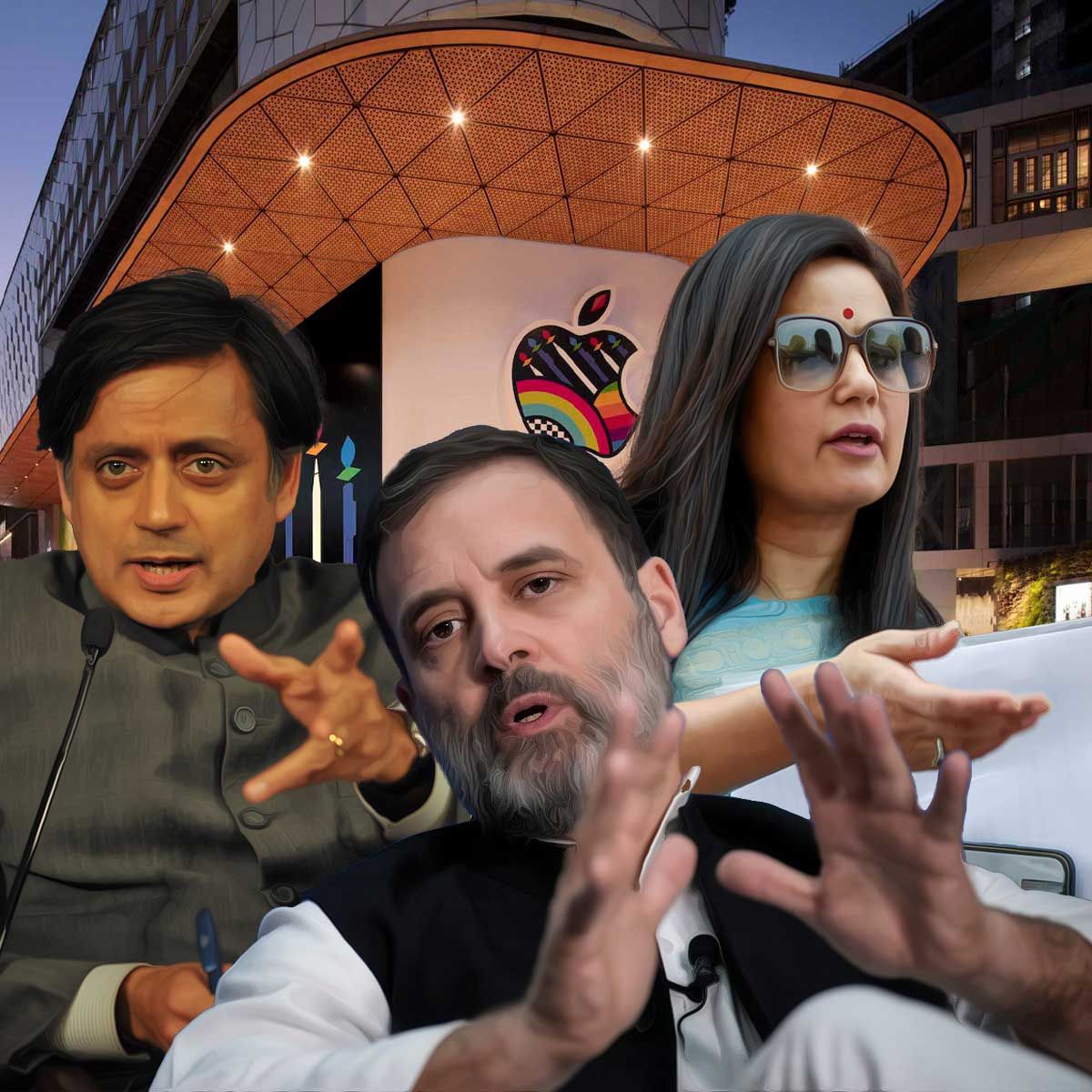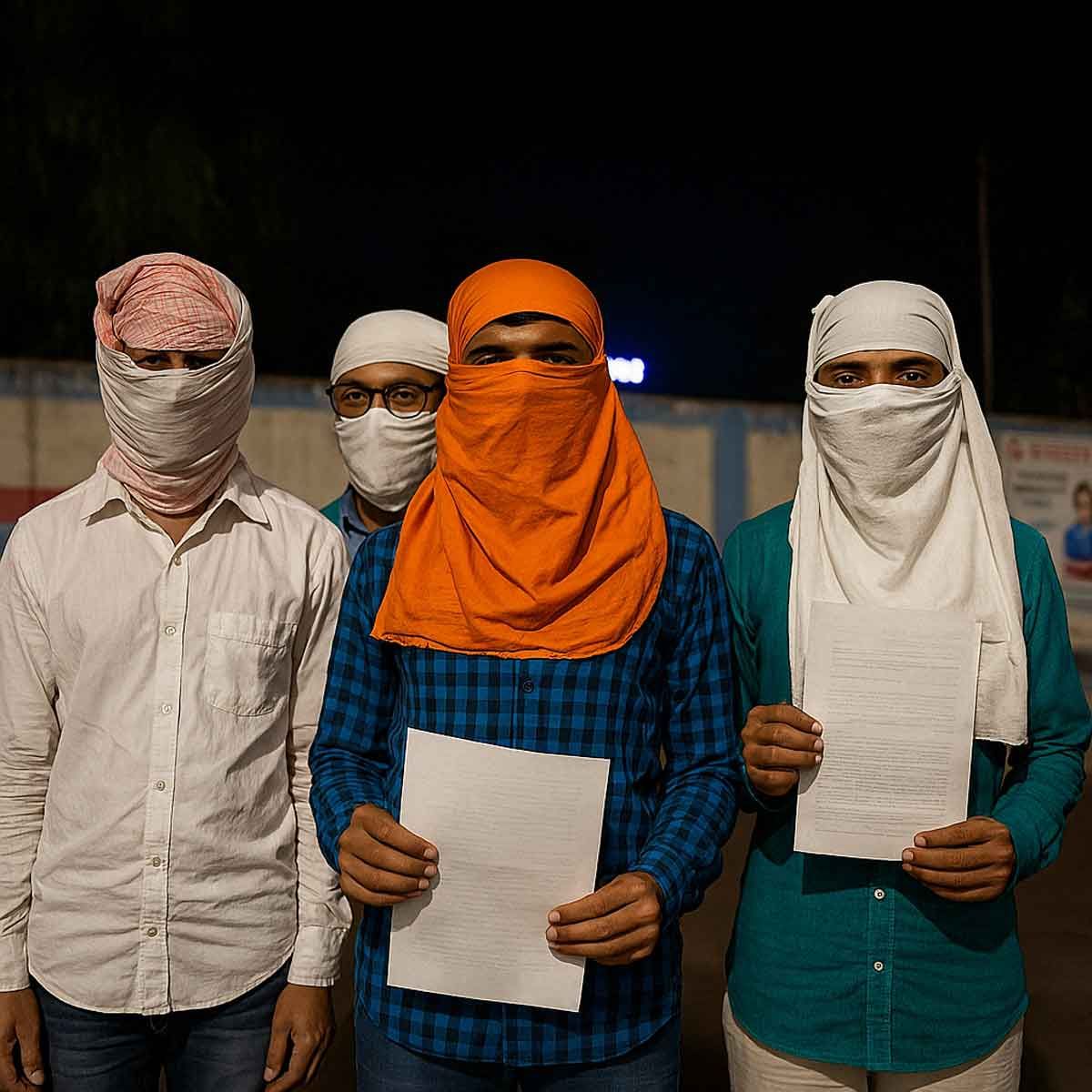More Coverage
Twitter Coverage
Satyaagrah
Written on
Satyaagrah
Written on
Satyaagrah
Written on
Satyaagrah
Written on
Satyaagrah
Written on
JOIN SATYAAGRAH SOCIAL MEDIA
"A desperate sequel to the Pegasus fiasco": India's political theater intensifies with MPs like Rahul Gandhi, Tharoor and Mahua Moitra receiving enigmatic cyber threat alerts, catalyzing a government probe in an already charged pre-election atmosphere

As the election drumbeats echo in the distance, a peculiar kind of pandemonium seems to have taken hold of India’s opposition ranks – a technological tempest in a teapot, replete with Apple alerts and accusations flying faster than tweets in the Twittersphere. It’s a scene that could rival the most farcical of satires, where the cyber-sleuthing is as earnest as it is erratic.
Imagine the moment: prominent opposition figures, armed with iPhones, suddenly find themselves recipients of dire warnings. The devices, usually reserved for selfies and speeches, transform into digital beacons of doom. "State-sponsored attackers may be targeting your iPhone," the screens ominously glow. It's the kind of message that could send shivers down the spine of any netizen, but for the vigilant MPs, it's a call to keyboards!
|
In an unexpected turn of events, a series of "threat alerts" from Apple have stirred up India's political scene, with various Opposition MPs reporting warnings of potential state-sponsored cyberattacks. These alerts, specifically stating, "ALERT: State-sponsored attackers may be targeting your iPhone," were delivered through iMessage and Apple Mail, triggering concerns among the nation's lawmakers.
Recipients of these notifications span multiple political parties, with figures such as Mahua Moitra, Shashi Tharoor, Pawan Khera, and several others confirming receipt. The cross-party nature of these alerts suggests a widespread issue rather than isolated incidents.
Adding to the discourse, Congress MP Shashi Tharoor publicly addressed his receipt of the alert: "Received from an Apple ID, This email address is being protected from spambots. You need JavaScript enabled to view it., which I have verified. Authenticity confirmed. Glad to keep underemployed officials busy at the expense of taxpayers like me! Nothing more important to do? @PMOIndia @INCIndia @kharge @RahulGandhi." Tharoor's sardonic comment hints at a deeper criticism of the government's priorities and the utilization of its resources.
In the wake of these events, the government has launched an investigation. This action comes amid Apple's own admission that such notifications might not be entirely reliable, adding a layer of complexity to the situation. This incident opens up a myriad of questions about digital security protocols, the reliability of corporate alert systems, and the dynamics between governmental surveillance and political figures in the digital realm.
The unfolding narrative of potential cybersecurity threats to Indian Opposition MPs takes a curious twist with Shashi Tharoor's handling of the Apple alert. Tharoor initially shared a screenshot of the email alert, inadvertently revealing his email ID linked to his Apple account. Recognizing the lapse, he promptly deleted the tweet and reposted the censored version. This oversight was not lost on observers, who noted that such a basic security misstep could greatly simplify unauthorized access to his devices—a concern particularly pronounced for a public figure of his standing.
|
Pawan Khera, another vocal member of the Opposition, took to social media with a pointed accusation, directing his concern towards the Prime Minister's office by asking, “Dear Modi Sarkar, why are you doing this?”
Meanwhile, Trinamool Congress MP Mahua Moitra, known for her forthrightness, also used the platform to express her views. Having recently admitted to sharing her Parliamentary login credentials—a serious breach of protocol—she now lashed out, labeling both the corporate conglomerate Adani and the PMO as "bullies."
|
These incidents collectively highlight a potential gap in digital literacy and cybersecurity awareness among some of India's lawmakers. They also underscore the charged political environment, where technical alerts can quickly escalate into public allegations and political statements. The implications of such security lapses and the ensuing public discourse raise significant questions about the intersection of technology, privacy, and politics in India's governance.
Mahua Moitra's reaction to the cyber threat alert from Apple was both defiant and dismissive. In a bold statement on social media, she wrote, “Received text & email from Apple warning me Govt trying to hack into my phone & email. @HMOIndia – get a life. Adani & PMO bullies – your fear makes me pity you. @priyankac19 – you, I, & 3 other INDIAns have got it so far.” Moitra's tweet not only disregarded the potential hacking attempt but also took a swipe at the Home Ministry, Adani, and the Prime Minister's Office, portraying them as adversaries driven by fear.
In the backdrop of these cybersecurity concerns, Moitra faces her own controversy. She's been summoned by the Lok Sabha Ethics Committee concerning the cash-for-query case, where she's accused by BJP MP Nishikant Dubey of accepting bribes and expensive gifts from businessman Darshan Hiranandani. While she admits sharing her Parliamentary login with Hiranandani, she staunchly denies any monetary exchange.
|
Amidst these individual reactions, Congress leader Rahul Gandhi took a more formal approach by holding a press conference where he leveled direct accusations against the BJP. He claimed that the party is using such alerts as a diversionary tactic, stating, “A number of people in my office have got this message… In Congress, KC Venugopal ji, Supriya, Pawan Khera have got it too…They (BJP) are trying to distract the attention of the youth.”
The allegations and counter-allegations continue to add layers to the political drama, with serious undertones of cybersecurity risks juxtaposed against claims of political machinations. The unfolding events seem to be painting a picture of a multifaceted political and technological battlefield, where the lines between security breaches and political tactics are becoming increasingly blurred.
|
As the discourse around the Apple threat alerts continues to unravel, it's becoming clear that the issue extends beyond party lines and into the wider sphere of public figures and civil society. Samir Saran, the President of the Observer Research Foundation (ORF)—a respected and independent think tank—also confirmed receiving such a notification. This suggests that the scope of the alerts may not be limited to political figures alone, broadening the implications of the potential security breach.
Furthermore, this issue isn't just localized to India. The same alerts have been reported by Apple users in Armenia, indicating an international dimension to the problem. Armenian journalist Artur Papyan urged fellow journalists and civil society representatives to come forward for assistance and support, a move that emphasizes the gravity of the threat and the need for collective vigilance.
|
In the wake of Rahul Gandhi's press conference, it’s crucial to highlight what Apple has said about these alerts. On their support page, Apple has indicated that notifications regarding "state-sponsored threats" might not always be accurate. This revelation from Apple introduces a layer of skepticism and necessitates a careful examination of the alerts' validity. It raises fundamental questions about the reliability of such warnings and the potential consequences of misinformation, whether due to technical error or other factors.
The complexity of the situation is evident as it involves not just the potential for state-level cyber espionage but also the integrity and reliability of the global tech giant's security notifications. As political leaders, journalists, and think tanks grapple with the implications of these alerts, it's clear that a nuanced understanding of the situation is necessary, balanced between vigilance against genuine threats and skepticism towards possible false alarms.
The intricacies of the alleged cybersecurity threats received by Opposition leaders in India take another turn with the specifics of Apple's alert. The message itself cautions recipients, stating, “While it’s possible this is a false alarm, please take this warning seriously.” This suggests that even the tech giant acknowledges the possibility of error, which underscores the complexities involved in accurately identifying cyber threats.
|
Apple's statements provide further context to the situation. The company has made it clear that it does not single out any specific state-sponsored group as the attacker due to the advanced and continually evolving nature of these threats. Their reliance on what they describe as "often imperfect and incomplete" threat intelligence signals contributes to the potential for false alarms. Apple's reticence to disclose the reasoning behind the issuance of such alerts is a security measure intended to prevent attackers from adapting and evading detection.
The ambiguity of these threat notifications is such that not only is the existence of an attack uncertain, but even if one is occurring, the identity of the perpetrator remains unknown. This uncertainty extends to the origin of any state-sponsored element, which could theoretically involve any nation.
In the wake of Rahul Gandhi's assertive press conference, where he accused the Modi government of spying on members of the opposition, Apple reiterated its stance. The company's statement aimed to clarify their position on the notifications, emphasizing the limitations and challenges inherent in the detection of sophisticated cyber threats.
These developments raise critical questions about the balance between maintaining national security and the privacy of individuals, especially key political figures. They also highlight the need for more transparent communication regarding such threats, both from corporations like Apple and the government entities involved.
Apple's stance on the threat notifications is encapsulated in their statement: “Apple does not attribute the threat notifications to any specific state-sponsored attacker. State-sponsored attackers are very well-funded and sophisticated, and their attacks evolve over time. Detecting such attacks relies on threat intelligence signals that are often imperfect and incomplete. It’s possible that some Apple threat notifications may be false alarms, or that some attacks are not detected. We are unable to provide information about what causes us to issue threat notifications, as that may help state-sponsored attackers adapt their behavior to evade detection in the future”.
The company's approach to these notifications is one of caution and restraint. By not assigning blame to a particular state actor, Apple acknowledges the broader landscape of cyber threats where identifying the perpetrator is not always straightforward. This non-attribution policy is likely a strategic decision to avoid the geopolitical ramifications that could arise from such claims.
The sophistication of state-sponsored attacks and their evolving nature make them particularly challenging to pinpoint and attribute. Apple's reference to "imperfect and incomplete" threat intelligence signals highlights the inherent difficulties in the field of cybersecurity, where definitive answers are often elusive.
Moreover, the potential for false alarms, along with the possibility of undetected attacks, adds to the complexity of the situation. Apple's reluctance to divulge their methods for issuing threat notifications is a protective measure aimed at preserving the integrity of their detection systems. By keeping these details confidential, Apple aims to prevent attackers from gaining insights that could enable them to refine their methods and circumvent future detection.
What are Apple threat notifications?
Apple threat notifications are a specific alert system, as the company details, "Apple threat notifications are designed to inform and assist users who may have been targeted by state-sponsored attackers." This acknowledgment from Apple underscores the gravity and specificity of the risk involved.
The targets of such attacks are selected based on their identity or their work, which sets them apart from the average user and makes them of interest to state-sponsored entities. Apple notes, "These users are individually targeted because of who they are or what they do. Unlike traditional cybercriminals, state-sponsored attackers apply exceptional resources to target a very small number of specific individuals and their devices, which makes these attacks much harder to detect and prevent." This emphasizes the sophisticated nature of state-sponsored cyberattacks, which are resource-intensive, highly complex, and often transient, aimed at achieving specific, time-sensitive goals.
Understanding the need for user verification of such serious alerts, Apple provides guidance: “To verify that an Apple threat notification is genuine, sign in to appleid.apple.com. If Apple has sent you a threat notification, it will be clearly visible at the top of the page after you have signed in.” This procedure is part of the tech giant's commitment to user security, ensuring individuals can confidently distinguish between legitimate warnings and potential misinformation or scams.
|
Modi government orders probe: What minister Ashwini Vaishnaw said
Following the emergence of threat notifications received by various MPs, the Modi government has swiftly initiated an investigation to address the potential security breach concerns.
Minister Ashwini Vaishnaw conveyed the government's stance, stating, “We are concerned by the statements we have seen in media from some MPs as well as others about a notification received by them from Apple. The notification received by them as per media reports mentions about ‘state-sponsored attacks’ on their devices”. Vaishnaw's remarks reflect the government's immediate attention to the claims made by the MPs and others who have received the warnings from Apple.
He also pointed out the ambiguous nature of the information provided by Apple, saying, “Information by Apple on this issue seems vague and non-specific in nature. Apple states these notifications may be based on information which is ‘incomplete or imperfect’. It also states that some Apple threat notifications may be false alarms or some attacks are not detected." This acknowledgment indicates the challenges faced in assessing the situation due to the limitations cited by Apple itself.
Highlighting Apple's assurance on user privacy, Vaishnaw mentioned, “Apple has also claimed that Apple IDs are securely encrypted on devices, making it extremely difficult to access or identify them without the user’s explicit permission. This encryption safeguards the user’s Apple ID and ensures that it remains private and protected." The minister's statement underscores the government's commitment to citizen privacy and security, reflecting an intent to thoroughly understand the genesis and veracity of the alerts.
In a decisive move to address the concerns and speculations, Vaishnaw announced, “The Government of Bharat takes its role of protecting the privacy and security of all citizens very seriously and will investigate to get to the bottom of these notifications. In light of such information and widespread speculation, we have also asked Apple to join the investigation with real, accurate information on the alleged state-sponsored attacks”. The call for Apple to provide concrete information indicates the government's pursuit of transparency and clarity on the matter.
As the government proceeds with the probe, the outcome and subsequent findings will be pivotal in providing a clearer picture of the cybersecurity landscape faced by public figures in India.
|
A desperate sequel to the Pegasus fiasco?
The recent Apple threat notifications have stirred up memories of the Pegasus spyware controversy that gripped India last year. On August 25th, the Supreme Court found no definitive evidence that the Indian government had used Pegasus to conduct surveillance. Chief Justice NV Ramana disclosed that the court-appointed committee did not find the Israeli spyware in any of the 29 mobile phones it scrutinized.
The original scandal broke on July 18, 2021, when allegations surfaced that Indian officials, activists, and journalists were among those potentially targeted by Pegasus malware. The NSO Group, the Israeli firm behind Pegasus, maintains that it sells only to governments, not private parties, though it has not publicly identified its clientele.
The claims about the Indian government's alleged use of the spyware stemmed from reports by international media, including The Wire from India, based on an "analysis" by Amnesty International. Notably, the Supreme Court-appointed committee also utilized Amnesty's detection tool, alongside other methods, in its investigation.
This backdrop of cybersecurity concerns casts the current situation with Apple's alerts in a particular light, suggesting a pattern of recurring suspicions around state surveillance tactics. With this context, the government's probe into the Apple notifications is not just about a single incident but about addressing broader issues of privacy, digital security, and trust between the state and its citizens.
As the narrative unfolds, one cannot help but marvel at the confluence of technology and politics, which, when combined, can create a comedy of errors that Shakespeare himself would have appreciated. As the election looms and the opposition’s digital drama plays out, the audience – the Indian electorate – awaits the final act, wondering if the curtain will fall on a tragedy or farce.
 Support Us
Support Us
Satyagraha was born from the heart of our land, with an undying aim to unveil the true essence of Bharat. It seeks to illuminate the hidden tales of our valiant freedom fighters and the rich chronicles that haven't yet sung their complete melody in the mainstream.
While platforms like NDTV and 'The Wire' effortlessly garner funds under the banner of safeguarding democracy, we at Satyagraha walk a different path. Our strength and resonance come from you. In this journey to weave a stronger Bharat, every little contribution amplifies our voice. Let's come together, contribute as you can, and champion the true spirit of our nation.
 |  |  |
| ICICI Bank of Satyaagrah | Razorpay Bank of Satyaagrah | PayPal Bank of Satyaagrah - For International Payments |
If all above doesn't work, then try the LINK below:
Please share the article on other platforms
DISCLAIMER: The author is solely responsible for the views expressed in this article. The author carries the responsibility for citing and/or licensing of images utilized within the text. The website also frequently uses non-commercial images for representational purposes only in line with the article. We are not responsible for the authenticity of such images. If some images have a copyright issue, we request the person/entity to contact us at This email address is being protected from spambots. You need JavaScript enabled to view it. and we will take the necessary actions to resolve the issue.
Related Articles
- "राहुल, नाम तो सुना होगा": In the latest political drama, Mamata Banerjee skillfully sidesteps condemning Kalyan Banerjee's mockery of VP Dhankhar, deftly throwing Rahul Gandhi under the bus, turning a serious political discourse into a masterclass circus
- Hours after poll strategist Prashant Kishor rejected Congress’ offer to join the party, Rahul Gandhi has been untraceable as he left India for a foreign visit: Priyanka Gandhi too has left for an undisclosed foreign location
- Is Maha Vikas Aghadi alliance in Maharashtra on the verge of an imminent collapse?
- Questioning the very idea of India as a ‘nation’, stoking sub-nationalism, and launching a tirade against the Modi government – Shehjada Rahul Gandhi’s new playbook of polarisation
- Congress veteran and former external affairs minister Natwar Singh schools Shehjada Gandhi, says 'China and Pakistan close allies since Nehru era, have illegally collaborated in the nuclear sector'
- Farmers gathered outside the residence of CM Ashok Gehlot and protested as banks are auctioning the agricultural land of farmers on failure to repay loans despite Rahul Gandhi’s tall promises: ‘Congress has ruined our lives'
- Manmohan Singh govt was ready to demilitarise the Siachen glacier and cede the control to Pakistan under the pressure of Americans, wanted to call it ‘Mountain of Peace’: Former Chief of Army Staff General JJ Singh
- "छिछोरा": Rahul Gandhi declares war on the Indian state, accusing BJP-RSS of capturing institutions, questioning Maharashtra polls, mocking Modi with slurs, blaming ECI, and distorting Mohan Bhagwat's remarks, fueling controversy with anti-India rhetoric
- Shehjada Rahul Gandhi shutted up by the speaker Om Birla in Lok Sabha when he permitted another MP to speak, says ‘You can’t give permission, that’s my right’
- Three generations of Nehru-Gandhi dynasty has visited Babur’s tomb in Afghanistan: Did you know?
- A Tale to revisit: Robert Vadra disowned his family publicly and then followed mysterious deaths
- While criticizing Modi govt's approach to the Women’s Reservation Bill, Rahul Gandhi once again seems to belittle Hindus by suggesting their temple Murthis lack genuine power, raising questions on his repeated insensitivity towards Hindu sentiments
- Golden time of Nehru dynasty, when assets of country like Indian Navy were used for Vacation and to 'pay respect' to Edwina Mountbatten's death
- Same Congress which is offering freebies in the states during polls has not paid rent for Lutyens Delhi bungalows for almost a decade, Rent worth crores pending: RTI revelation
- Raj Thackeray roared today at the ‘Uttarsabha rally ‘ while rebutting counter-allegations against him made by Maha-Vikas-Aghadi leaders: He spoke fiercely demanding UCC, unequivocally supported Hindutva, and lashed out at MVA leaders




























